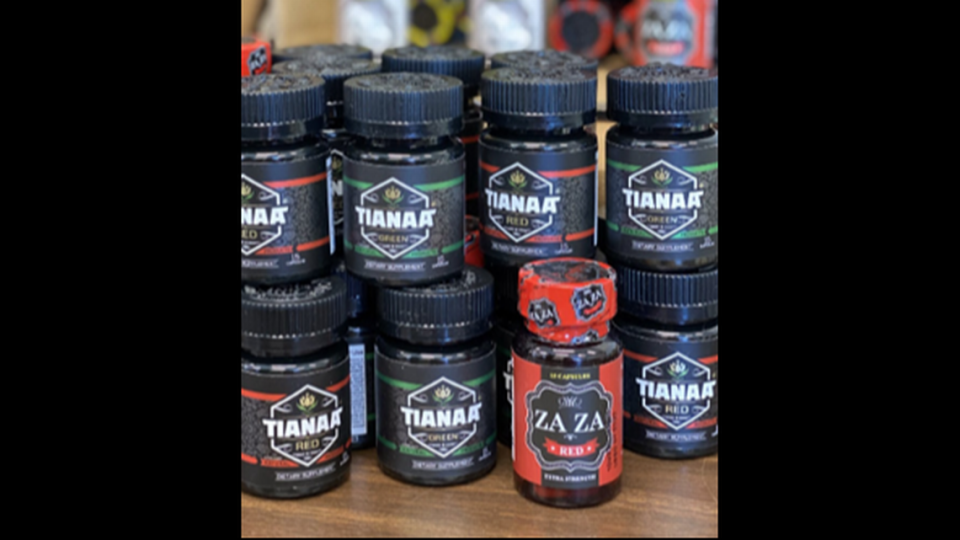‘Gas station heroin’ banned in 9 states. What is tianeptine and why is it dangerous?
- Oops!Something went wrong.Please try again later.
Dietary supplements containing the ingredient tianeptine are the subject of bans across the United States after health officials warned of the potential risks.
Florida Attorney General Ashley Moody became the latest public official to announce an emergency ruling on Sept. 21, banning the sale of tianeptine and changing its classification to a Schedule I controlled substance.
Tianeptine was already banned in eight states — Alabama, Georgia, Indiana, Kentucky, Michigan, Mississippi, Ohio and Tennessee — after warnings from health officials, Moody said.
From 2020 to 2022, more than 600 calls were made to poison control centers after exposure to tianeptine, resulting in five deaths, Moody said.
The drug remains on shelves in other states, and it’s still available online.
Here’s what you need to know.
What is tianeptine?
Tianeptine, also known by its pharmaceutical names Coaxil or Stablon, was developed as an antidepressant drug used in Europe, Asia and Latin America, according to a study by the Centers for Disease Control and Prevention.
The drug increases the amount of serotonin the brain can take in, thereby decreasing the brain’s physical response to stress, according to a 2001 study published in CNS Drugs.
Despite its use internationally, tianeptine was not approved by the Food and Drug Administration for use in the United States, citing the high risk that the drug could be overused or abused.
Tianeptine causes a similar high to opioids when taken in larger doses, Moody said, as well as similar overdose symptoms.
It’s also just as addictive, especially among those already using illegal substances.
A 2018 study found that 63% of the tianeptine users included in the study were addicted to other things, as well as the dietary supplement, Vice News reported.
Unlike the other Schedule I drugs, tianeptine can be delivered to your door with a few clicks of a computer mouse or purchased after a walk to the corner store.
What products contain tianeptine?
Though tianeptine isn’t approved for medical use, it’s still sold as an ingredient in products marketed as dietary supplements online and in some gas stations and convenience stores in the United States.
It’s sold under the names Pegasus, Tianaa or Zaza Red, among others, and is often referred to by its nickname “gas station heroin,” according to Moody.

The supplements also list tianeptine under other names on the supplements.
Tianeptine sulfate, tianeptine sodium powder, tianaa, tianna green, tianna red and tianna white are all names for the same drug, according to the FDA.
The products sell the drug as a pill or powder, and the bottles say it provides energy and helps with depression. Websites selling the pills offer a warning that it can’t be shipped to the nine states with bans.
It’s also sold on the same websites as Kratom, an herbal pain reliever at the center of multiple wrongful death lawsuits, McClatchy News reported.
Is tianeptine safe?
The short answer is no, tianeptine is not safe to consume in the form currently available.
But health officials would say it’s the dose of the drug that is unsafe, not necessarily the drug itself.
“Medical journals and reports to the FDA suggest that adverse events may occur when tianeptine is taken at doses higher than the doses prescribed in the country where the drug has been approved,” the FDA said in a news release. “Some people may have difficulty stopping their use of tianeptine and may experience withdrawal symptoms.”
The FDA noted cases where people abusing tianeptine alone, or with other drugs, experienced agitation, drowsiness, confusion, sweating, rapid heartbeat, high blood pressure, nausea, vomiting, slowed breathing, coma and death.
There is also little to no oversight of the $46 billion dietary supplement industry, Consumer Reports reported in 2021, meaning there may be other harmful things in the supplements that aren’t listed.
Dietary supplements don’t need FDA approval for sale, meaning it’s up to the states to monitor and control the types of products that can be sold.
The Florida poison control center received 15 exposure calls in the first half of this year, Moody said, from users ranging in age from 23 to 58.
“Calls into the center are voluntary, so the number of cases likely exceeds those reported,” Moody said.
October is Breast Cancer Awareness Month. Who should get screened, when and where?
Health experts expand RSV vaccine recommendations. Here’s who should get the shot
Insurance companies deny COVID booster to thousands of people every day. What to know
These popular cold medicines don’t work, FDA says. What should you take in flu season?

